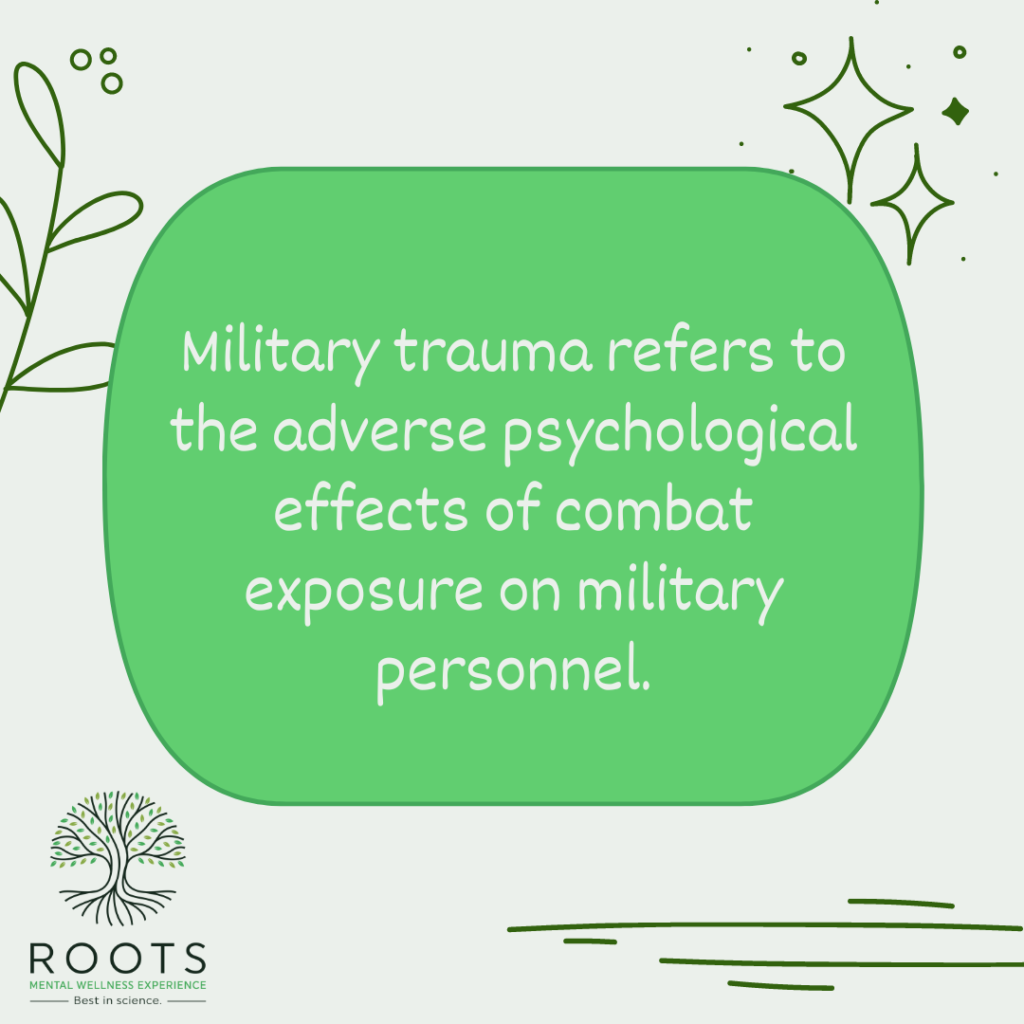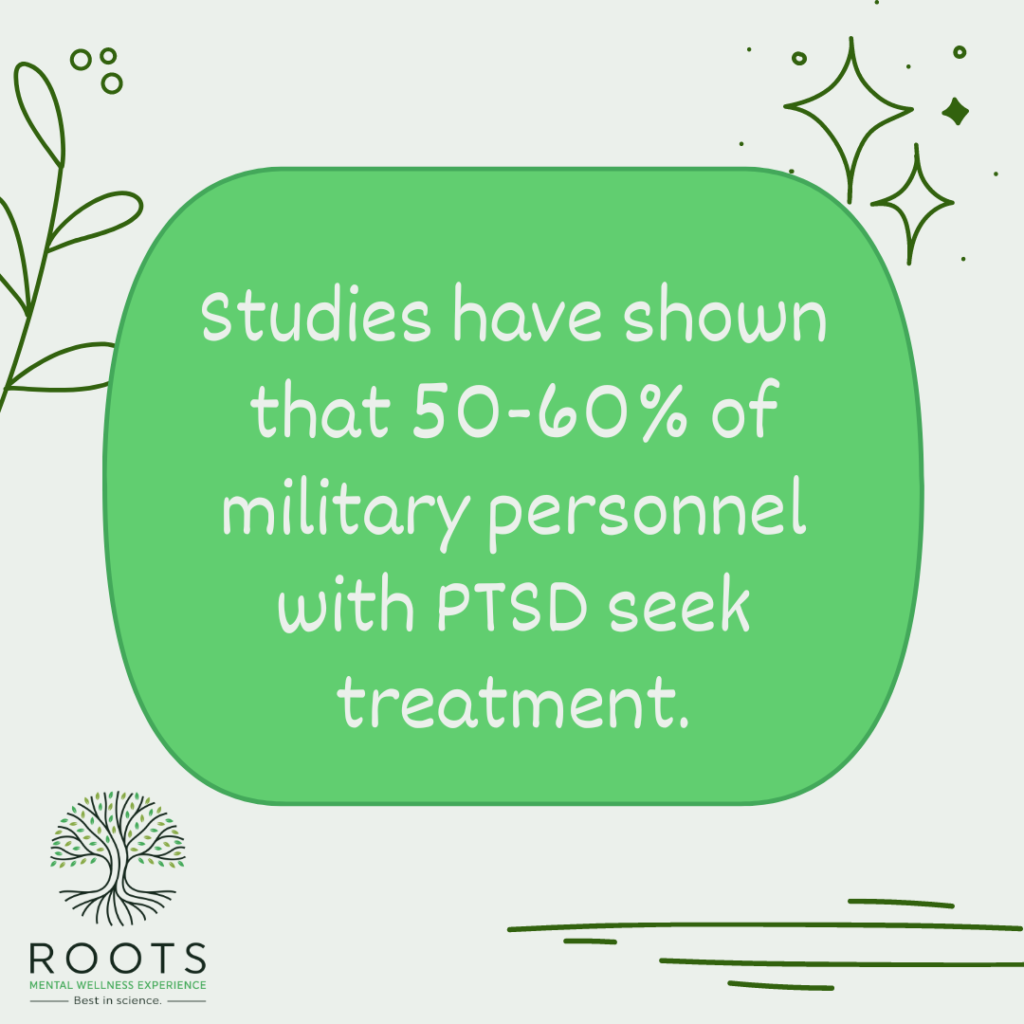Military trauma refers to the adverse psychological effects of combat exposure on military personnel. It can result from the stress of deployment, witnessing or being involved in combat-related violence, and loss of friends or comrades. The most common condition associated with military trauma is Post-Traumatic Stress Disorder (PTSD).

Post Traumatic Stress Disorder (PTSD)
PTSD is a mental health disorder that can occur after experiencing or witnessing a traumatic event. It is characterized by symptoms such as re-experiencing the trauma through flashbacks or nightmares, avoidance of reminders of the trauma, and hyperarousal, including difficulty sleeping and being easily startled.
Signs and Symptoms
The signs and symptoms of PTSD can include:
- Intrusive thoughts: Recurrent and involuntary memories of the traumatic event, often accompanied by vivid flashbacks or nightmares.
- Avoidance: Efforts to avoid people, places, or activities that trigger memories of the traumatic event.
- Negative changes in mood and thoughts: Persistent feelings of sadness, guilt, anger, or hopelessness, as well as negative changes in thoughts and beliefs, such as a distorted view of oneself or the world.
- Arousal and reactivity symptoms: Irritability, anger, trouble sleeping, difficulty concentrating, and an exaggerated startled response.
- Hypervigilance: A state of increased alertness and tension, accompanied by a constant state of worry or fear.
It is important to note that these symptoms can occur soon after the traumatic event or may develop over time. Additionally, not all individuals who experience trauma will develop PTSD, and some individuals may experience symptoms for a brief period before recovering, while others may experience symptoms for a longer time.
The prevalence of PTSD among military personnel is estimated to be between 6-17%. Not all individuals who have experienced trauma will develop PTSD, but seeking support and treatment can help mitigate the risk of developing a condition

Treatment for PTSD
It is crucial for military personnel to seek help for PTSD because, if left untreated, PTSD can lead to an increased risk for substance abuse, depression, and suicide. Family support and resources are also important for individuals with PTSD, as loved ones can play a significant role in their recovery. Treatment for PTSD often involves a combination of psychotherapy and medication. The most effective psychotherapies for PTSD are Cognitive Behavioral Therapy (CBT), which helps individuals learn coping skills and challenge negative thoughts and beliefs related to the trauma, and Eye Movement Desensitization and Reprocessing (EMDR) therapy.
EMDR for treatment of PTSD
Eye Movement Desensitization and Reprocessing (EMDR) is a type of psychotherapy that is used to treat PTSD and other anxiety disorders. EMDR is based on the theory that traumatic memories are stored in the brain in an unprocessed form, leading to ongoing distress and symptoms of PTSD.
EMDR therapy involves having the patient focus on the traumatic event while simultaneously performing eye movements or other bilateral stimulation, such as tapping or audio stimulation. The goal of EMDR is to help the patient process the traumatic memory and reduce the intensity of their emotional and physiological reactions to it.
During EMDR therapy, the therapist guides the patient through the memory, helping them recall specific details and associated emotions. The patient then focuses on this memory while performing eye movements or other bilateral stimulation, which is thought to help activate the brain’s natural information processing system and allow the patient to process it.
EMDR has been shown to be effective in reducing symptoms of PTSD in multiple studies and is considered a recommended treatment for PTSD by several organizations, including the International Society for Traumatic Stress Studies and the U.S. Department of Veterans Affairs.

Access to Care
Studies have shown that 50-60% of military personnel with PTSD seek treatment.
Barriers to accessing treatment for PTSD can include stigma surrounding mental health, lack of awareness of available treatments, difficulty accessing care in rural or remote areas, and concerns about career impacts. Additionally, some military personnel may feel that seeking treatment for PTSD is a sign of weakness and may be reluctant to do so.
Despite these barriers, it is important for individuals with PTSD to seek treatment, as it can greatly improve their quality of life and help them overcome the effects of trauma. With effective treatment and support, many military personnel with PTSD are able to successfully manage their symptoms and regain their health and well-being.
Military personnel can access treatment for PTSD through several channels:
- Military Treatment Facilities (MTFs): MTFs provide comprehensive health care services to active duty military personnel, including treatment for PTSD. MTFs offer a range of mental health services, including psychotherapy, medication management, and support groups.
- Department of Veterans Affairs (VA): Veterans can receive PTSD treatment through the VA, which operates a nationwide network of healthcare facilities and services. VA facilities offer a range of mental health services, including psychotherapy, medication management, and support groups.
- Tricare: Tricare is a healthcare program for military personnel, veterans, and their families. Tricare covers the cost of mental health services, including treatment for PTSD, and can be accessed through MTFs or through civilian providers. Roots Through Recovery is a trusted in-network provider for Tricare and has been providing care to military personnel and their loved ones since 2018.
- Employee Assistance Programs (EAPs): EAPs are confidential counseling services offered by many employers, including some military organizations. EAPs can provide support and referrals for individuals seeking treatment for PTSD.
- Private providers: Military personnel can also access treatment for PTSD through private providers, such as psychologists or psychiatrists. However, it is important to note that treatment through private providers may not be covered by insurance or may require out-of-pocket expenses.
It is important to note that military personnel who are experiencing symptoms of PTSD should not hesitate to seek treatment, as early intervention can improve outcomes and reduce the impact of PTSD on their health and well-being. Service members can reach out to us directly to learn more about available treatment options and how to access care.




